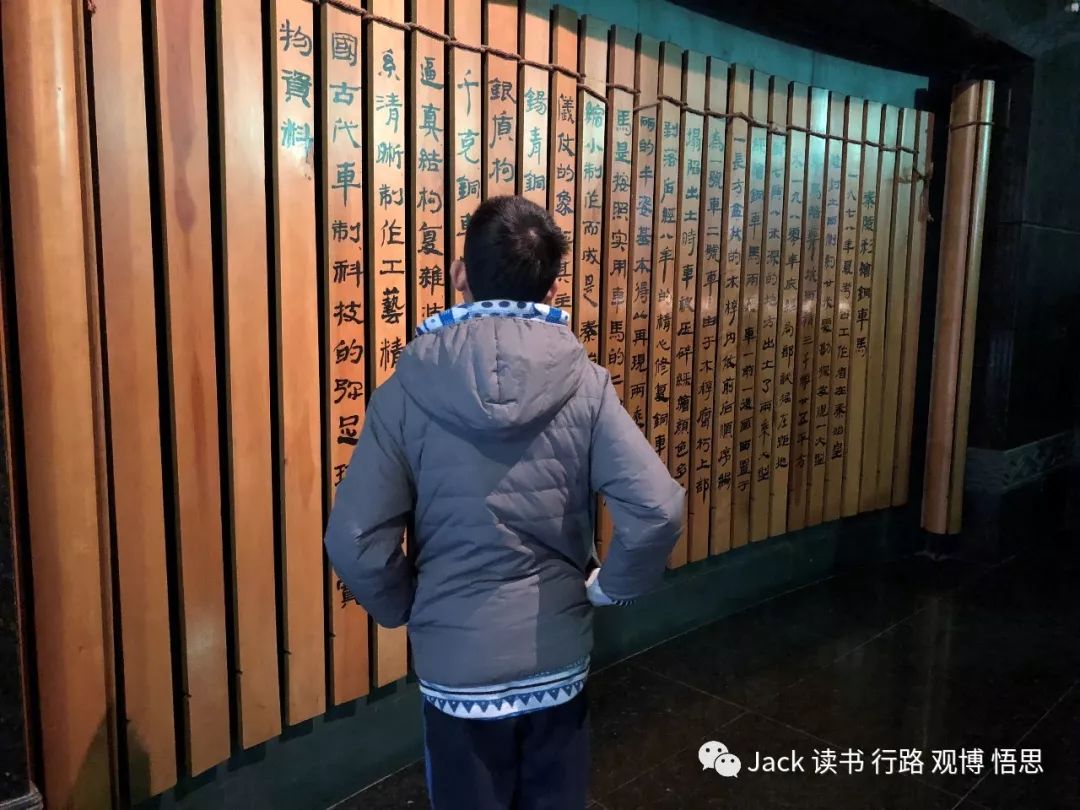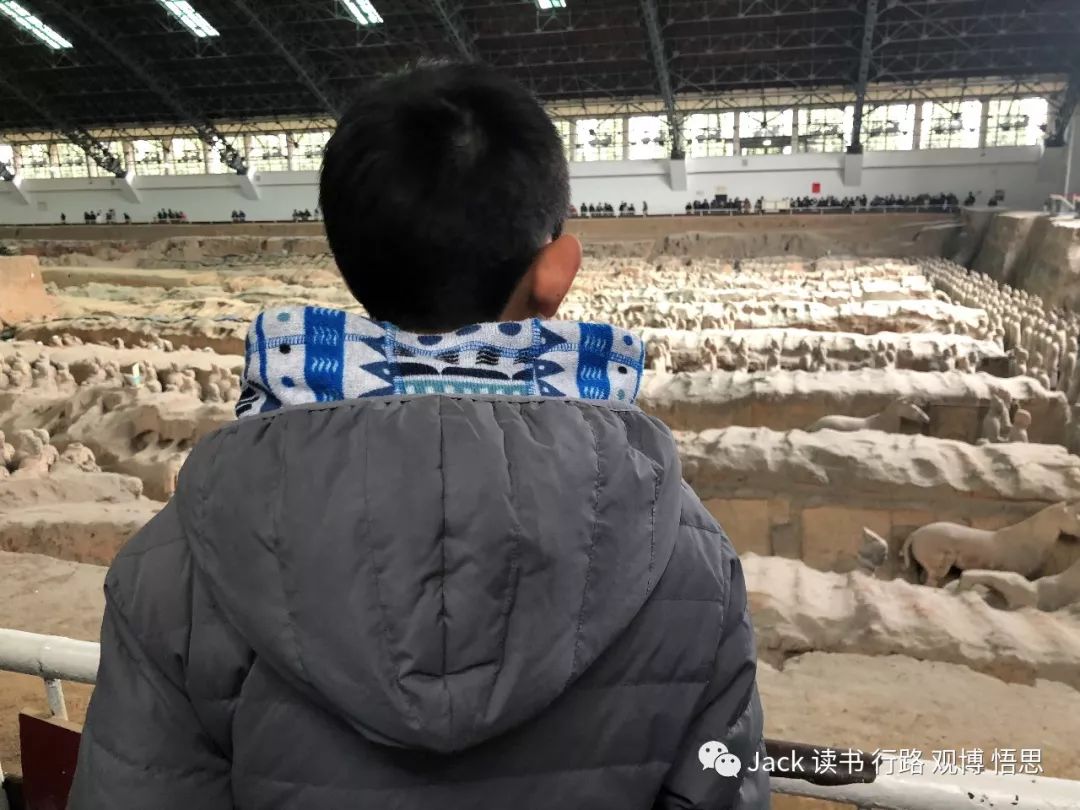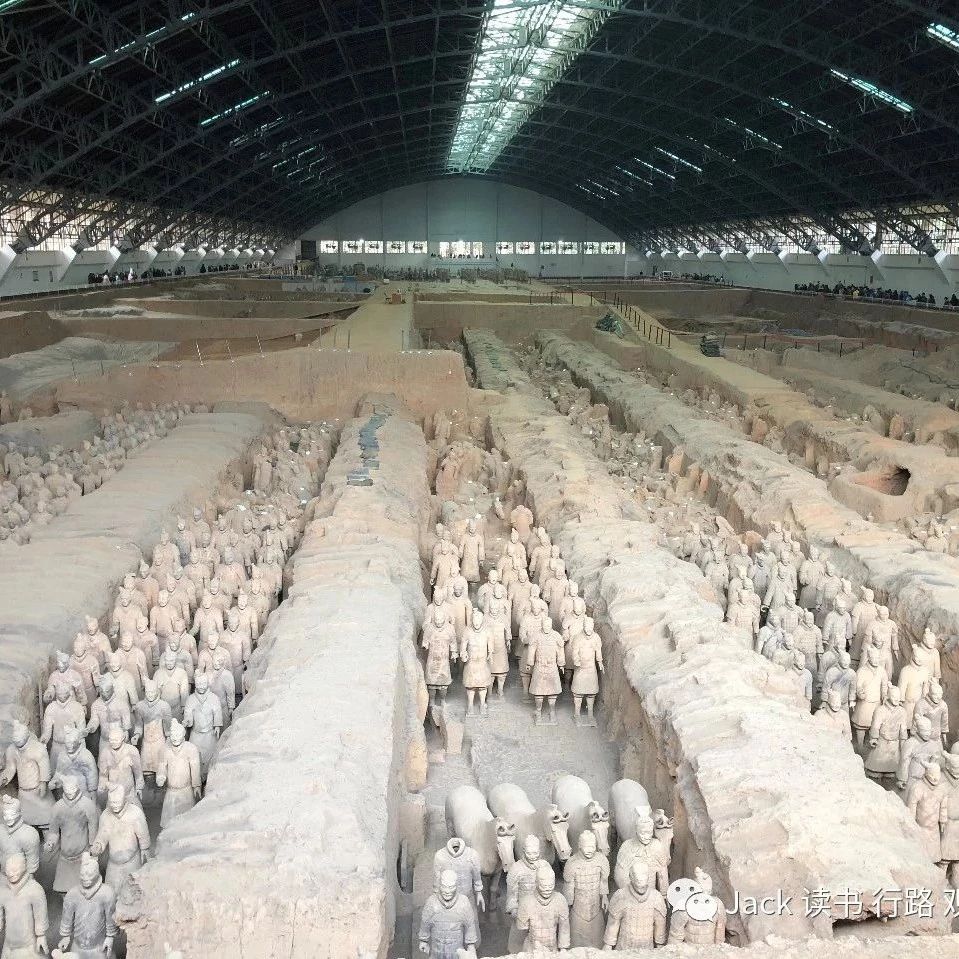Read History with Jack 17 the Qin Empire
大秦帝国

中国漫长的历史就像一条大河,时而平静,时而湍急。春秋战国,群雄争霸,从西陲小国到天下霸主,大秦帝国像一轮新生的太阳,从一片混乱中冉冉升起。它废除特权、奖励军功,重视农业,推行法制,它统一文字、度量衡,奠定了中国的版图,为中国历史翻开新的篇章!
秦统一六国,并非嬴政一人的功劳。在他之前,秦国的历代君王励精图治,富国强兵。秦孝公时期,秦国颁布了《求贤令》,不拘一格,吸引人才,以增强国家的实力和影响力。一个名叫商鞅的魏国人,赶紧跑到秦国来为秦孝公效力。商鞅推行法家思想和政策,讲究“令出必行,有功必赏,有禁必止。”商鞅的变法革新,对秦国后续的飞速发展起到了相当重要的作用,秦国变成了一个农业和军事强国。接下来的秦惠文王、秦昭襄王继续文攻武略,为秦的最后统一做出巨大贡献。

在去西安的兵马俑和陕西历史博物馆之前,我一直认为秦始皇嬴政是一个暴虐的君王。然而,从阅读大量记载和参观博物馆深入了解之后,我觉得不能完全相信一些传言和史料。秦始皇于公元前259年出生于赵国的首都邯郸,13岁被立为秦王,但是他只是一个权力傀儡而已。真正的大权掌握在太后和大臣手中。公元前238年,秦王嬴政已经22岁,他开始自己独揽大权,处理国家大事。他干的第一件事就是与吕不韦联盟,平息了长信侯嫪毐的叛乱,接下来他又把吕不韦贬到四川,吕不韦自杀。年纪轻轻就一举灭掉两个强大的权利集团,可见秦始皇是一个多么有政治头脑和权谋的人。之后,秦始皇又用了十载春秋,势如破竹,所向披靡,以气吞万里之势,一统天下。他平定了几百年的战乱,统一了文字、度量衡、规定车同轨、书同文、奠定了中国现今的版图。他还在北部的边境上修建长城,抵抗外来入侵。他还命令在全国修筑驰道。秦始皇非常勤政,每天必读120斤的书简,不读完不休息。秦始皇从积极的方面讲,可以称之为“千古一帝”。
但是,秦始皇也很残暴。在他统治的时期,用人民的血和肉修建了大量的工程,奢华的宫殿、宏大的陵墓、千里的驰道、万里的长城,这些耗费了大量人力物力和财力,使人们不得安居乐业。秦始皇还推行严酷的法律,焚书坑儒,禁锢思想,大批人才被处死。这些都是秦朝昙花一现但又迅速灭亡的原因。一个庞大的帝国,不能靠暴力和酷刑统治,如果这个帝国的君王不得民心,那这个帝国无法存活太久。
我认为,秦始皇是一个双面的君王。从一方面讲,他完成了统一六国的大业,为中国后来的发展起到了相当重要的作用。然而,从另一方面讲,秦始皇的政权和统治国家的方式,最终也使这么辉煌的秦国走向覆灭。但是,他的丰功伟绩和那些巨大工程给整个世界留下了一批宝贵的遗产,大秦帝国是整个中华文明史中最壮阔的篇章之一!
The great Qin Empire

The history of China looks like a great river, sometimes it flows slowly, while sometimes it flows rapidly. The period before the Qin Empire, 6 different countries fought each other, and a country called Qin was no more than a small country situated in the west. However, no one could predict that the Qin Empire would rise like a new-born sun out of the west. It abolished a lot of privileges from the aristocrats, awarded military exploits, attached importance to agriculture, and carried out harsh laws. This empire also unified the characters of the Chinese, measurements, and also established the basic territory on which China lies.
The unification of the other 5 countries was not only the effort of the Emperor YingZheng. Before him, the other monarchs of Qin also did a very good job at building up the countries’ strength in economy,military, and other important aspects. In the period when QinXiaoGong ruled, he issued a talent-seeking decree. This king really craved for talents. A man called Shangyang from the country Wei, travelled to Qin and rendered service to QinXiaoGong. ShangYang devised a set of harsh laws and policies. His new laws and policies established a strong base for the later development of Qin, and it quickly became a powerful military country. After QinXiaoGong, the subsequent monarchs also made great contributions to this country, and beefed up this country.

Before I went to Xi’an and the Terra-cotta Museum, I thought that Emperor Qinshihuang was a violent ruler. However, after read a lot of information and saw some exhibitions, I think that we should not rely on what the history books said absolutely. Qinshihuang was born in 259 B.C in the country Zhao’s capital Handan. He assumed the throne when he was only 13, but the real power was controlled by Qinshihuang’s mother, the Queen, and the Emperor’s regents. In 238 B.C, Emperor YingZheng was already 22 years old, he started to rule the whole country by himself. The first thing he did was to create an alliance with one of his regents called Lubuwei, and crushed a rebellion aroused by the Queen’s intimate servant LaoAi. Then, to further stabilize his power, he exiled Lubuwei to Sichuan, where he committed suicide. He defeated two powerful rights group at such a young age, therefore we could see that he was very shrewd and possessed a political mind. Following this act, he used 10 years to conquer the other 5 countries in an effective way. He stopped the wars going constantly between countries, and unified China, including itscharacters and measurements. He also stipulated that the length between two wagon wheels should be exactly 6 inches long. Moreover, the Emperor built a huge defensive wall on the empire’s northern border, the Great Wall, in order to prevent the ethnic minority groups from invading the central plains. Furthermore, he gave orders to construct long roads connecting places, some ofthem stretching for thousands of kilometers. Emperor YingZheng was very diligent, he forced himself each day to read 120 bamboo slips, and he rested unless he read them all.
However, Emperor YingZheng was indeed very inhuman sometimes. When he reigned, he erected large projects by many citizens’ flesh and blood, such as luxurious palaces, long lasting roads, and great walls stretching thousands kilometers. Constructing all these things needed a huge amount of manpower and materials, which consequently became one of the reasons why the Qin Empire fell so fast. Moreover, Emperor YingZheng practiced very harsh and unforgiving laws; he burned many useful books and buried many talents in order to secure a highly centralized government. A vast empire could not be controlled by violence at last. If the monarch of this empire didn’t gain support from his citizens, then this empire would not last long.
In my opinion, Emperor YingZheng was a round and double-sided person. On one hand, he unified China and mostly what he did is useful for China’s future development. However, on the other hand, his way to rule the empire also caused the Qin Dynasty to fall quickly. However, his huge projects wield a huge amount of valuable treasure for archaeologists and historians, and hence became the greatest page on the whole Chinese history!
- 本文标签: 原创
- 本文链接: http://www.jack-utopia.cn//article/530
- 版权声明: 本文由Jack原创发布,转载请遵循《署名-非商业性使用-相同方式共享 4.0 国际 (CC BY-NC-SA 4.0)》许可协议授权










